
“Had there been within the heavens and earth gods besides Allah, they both would have been ruined”
“Had there been within the heavens and earth gods besides Allah, they both would have been ruined”
[Part: 17, from Surah Al Ambia to Surah Al Haj, ayah 78]
By: Mufti Jaseemuddin Qasmi
Coordinator Online Darul Ifta & Lecturer
MMERC, Mumbai
﷽
Part 17 starts with Surah Al Ambia. This is Makkan surah and it consists of 112 ayahs. Allah says in the first ayah of this surah, “The time of people’s reckoning has drawn near, but they turn away heedlessly.” Next few ayahs mention the situation of the stubborn disbelievers, “Whenever a new advice comes to them from their Lord, they do not listen to it except while playing.” With their hearts distracted. And those who do wrong conceal their private conversation, [saying], “Is this [Prophet] except a human being like you? So would you approach magic while you are aware [of it]?” “ Rather they said, ” “[The revelation is but] a mixture of false dreams; , but in fact he has fabricated it – but in fact he is a poet; so he must bring us some sign, like those who were sent before.”
In response to these vile objections of the disbelievers, it was said in ayah 7, “And We sent not before you, [O prophet], except men to whom We revealed the message, so (tell them) ask the people of the message if you do not know.”
Ayah 18 says, “Rather, We dash the truth upon falsehood, and it destroys it, and thereupon it departs. And for you is destruction due to the matters you fabricate.”
In ayah 22, a logical reason is presented for Oneness of God, as Allah says “Had there been within the heavens and earth gods besides Allah, they both would have been ruined. So exalted is Allah, Lord of the Throne, above what they describe.”

If there were more than one god in this universe, then each god would possess independent authority, and none would be subordinate to another. In such a case, differences could arise in their decisions. Now, if one god made one decision and another made a different decision, then either one of them would yield to the other—yet how could he still be called a god if he submits to another? Or, both would strive to enforce their own decisions, and the enforcement of contradictory decisions would throw the system of the heavens and the earth into chaos.
Ayah 30 stats, “Have those who disbelieved not known that the heavens and the earth were a joined entity, and We separated them and made from water every living thing? Then will they not believe?”
The closing of the heavens means that no rain used to fall from them, and the closing of the earth means that it did not produce any vegetation. The opening of both means that rain began to pour down from the heavens, and vegetation began to grow from the earth. Another interpretation is that the heavens and the earth were joined together, and Allah, the Exalted, separated them from one another.
The disbelievers of Makkah used to say regarding the Prophet (saws) that they were waiting for his death. By this, they meant that they would rejoice at the time of his death. In response to this, ayah 34 was revealed which says, “And We did not grant to any man before you a never-ending life on earth; so if you die – would they be eternal?”
In ayah 37 it is stated that man has been created with a nature of haste.
After this, the story of Prophet Ibrahim (as) is mentioned in detail, in which it is stated that when he broke the idols, Nimrod cast him into the fire; but Allah made the fire coolness and peace for him. When the attempt to burn Ibrahim failed, Nimrod was overawed and did not dare to say anything to him. Then, by Allah’s command, Ibrahim migrated with his nephew Prophet Lot (as), the only one who had believed in him, from Iraq to the area of Syria. This is referred to in ayah 71.
Story of Prophets Dawood and Sulaiman (as)
In ayah 78, an incident concerning Prophet Dawood (David) (as) and his son Prophet Sulaiman (Solomon) (as) is mentioned. The incident was that a man’s goats entered another man’s field at night and destroyed the entire crop. The owner of the field brought the case before Prophet Dawood (as). Prophet Dawood (as) judged that it was the duty of the goat owner to tie up his goats at night, and since through his negligence the field owner had suffered loss, the goat owner should give the field owner as many goats as would equal the value of the destroyed crop. This judgment was fully in accordance with the law of the Sharīʿah.

However, when they were leaving, Prophet Sulaiman asked them at the door what decision his father had given. They informed him, whereupon Sulaiman said that another solution had come to his mind in which both parties could benefit. When Prophet Dawood heard of this, he called him and asked what that solution was. Sulaiman said: the goat owner should, for a period of time, give his goats to the field owner so that he may benefit from their milk, etc., while the field owner should hand over his field to the goat owner, so that, he may cultivate it. Once the field is restored to the same state it was before the damage, then the field owner should return the goats to their owner, and the goat owner should return the field to him. This was a form of settlement in which both parties benefited, so Prophet Dawood (as) approved of it, and both the parties agreed to this decision.
Allah says in ayah 79, “And We gave understanding of the case to Sulaiman, and We gave wisdom and knowledge to each of them. And We subjected the mountains and birds to glorify Our Praises, along with Dawood. And We were doing that.”
Since the judgment of Prophet Dawood (as) was in accordance with the actual law, and the proposal of Prophet Sulaiman (as) was a form of reconciliation through mutual consent, Allah Almighty stated regarding both of them that We had granted them knowledge and wisdom. However, concerning the reconciliation proposed by Prophet Sulaiman (as), Allah said that We granted him that understanding. From this, it is also learned that during a case, reaching reconciliation with mutual consent of the parties is better than merely obtaining a legal verdict.
Allah Almighty had granted Prophet Dawood (as) a very melodious voice. As a miracle, he was given the special quality that when he remembered Allah, the mountains would join him in remembrance and glorification, and even the flying birds would stop and begin to remember Allah along with him.
Allah says in ayah 80, “And We taught him the art of making the coats of armor to protect you from each other’s violence. So will you then be grateful?”
The Islamic scholars have stated under this ayah that it highlights the value of every craft or industry that is beneficial for human beings. From the practice of Prophet Dawood (as), it also becomes clear that being a devoted servant of Allah does not mean engaging only in acts of worship; rather, earning a livelihood through hard work is also encouraged in the Shari‘ah and is considered a religious duty. Furthermore, the best means of livelihood, as mentioned in the noble Hadith, is earning through one’s own labor and effort. Accordingly, in Sahih al-Bukhari, the Messenger of Allah (saws) said: “No one has ever eaten food better than that which he earned with his own hands. And indeed, the Prophet of Allah Dawood (as) used to eat from the earnings of his own hands.”
In Ayah 81, Allah says, “And We subjected to Sulaiman the strongly blowing wind which blows by his command towards the land which We had blessed. And of everything We are the All-Knower.”
Even something as subtle as the wind was placed under the command of Prophet Sulaiman (pas). Thus, when he sat upon his throne and commanded the wind, it would carry him wherever he wished.
Furthermore, it is mentioned that Allah also placed under his control those jinn who were rebellious and disbelieving. By his command, they would dive into the sea, bring out pearls, and present them before Prophet Sulaiman (as).
Prophet Ayyub (as)
In ayah 83, Allah says, “And remember Ayyub (Job), when he called to his Lord, “Indeed, adversity has touched me, and you are the Most Merciful of the merciful.”
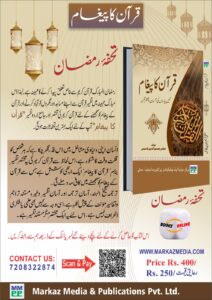
Regarding Prophet Ayyub (as), the Qur’an tells us only that he was afflicted with a severe illness, yet he remained patient and steadfast, continually calling upon Allah until Allah granted him recovery. As for the nature of that illness, the Qur’an did not consider it necessary to describe, and most of the narrations circulated about it are not authentic.
In the following ayah, it is mentioned that Allah accepted his prayer and granted him recovery. During his illness, most of his household abandoned him except for his loyal wife who remained by his side. When he regained his health, Allah blessed him with children and grandchildren, doubling the number of those who had left him during his suffering.
Ayah 85 says, “And Ismael, and Idris(Enoch) and Dhu’lKifl(Isaiah); all were of the patient ones.”
As for Dhul-Kifl, the Qur’an only mentions his name; no incident about him is narrated. Some commentators hold the view that he was a prophet, while others say that he was the successor (caliph) of Prophet Yasaʿ (Elisha, as). According to this latter view, he was not a prophet, but a great pious friend of Allah. (And Allah knows best.)
Ayah 92 expresses the teaching of monotheism, “(O people) indeed this religion, (to which all the prophets called), is your religion—one and the same religion. And I am your Lord, so worship Me alone.”
The following ayahs explain that Allah had given mankind one religion, but people divided it into factions among themselves. Who is truly upon the right path—this decision will be made by Allah Himself. The criterion of that decision will be: whoever had faith in Allah and did righteous deeds, their deeds will not go to waste; rather, they will be rewarded in the best way.
It is also made clear that Allah does not send punishment upon any community as long as there are people of faith and good deeds among them.
The final judgment will be made on the Day of Resurrection. One of the signs of that Day is that the savage tribes of Gog and Magog will surge forth in immense numbers, attacking the earth. Their onrush will appear as though they are sliding down from every height.
In ayahs 98 and 99, it is declared that those who worshipped idols—their idols too will be cast into Hell, so that the idolaters may see for themselves: had these really been gods, they would not have been thrown helplessly into Hell.
﷽
The Horrors of the Day of Resurrection
Here begins Surah Al-Hajj. Some parts of this surah were revealed in Makkah and some parts in Madinah. In its opening ayahs 1 and 2, the Day of Resurrection and its terrors are described. Thus, it is stated: “O mankind, fear your (wrath of) Lord. Indeed, the convulsion of the Last Hour is a terrible thing. On the Day you see it every breastfeeding mother will be distracted from that child she was nursing, and every pregnant woman will abort her pregnancy, and you will see the people as if they are intoxicated while they are not intoxicated; but the punishment of Allah is severe.”
Those who were in doubt about being resurrected after death, are addressed in ayah 5, where the matter is clarified for them through a detailed example.
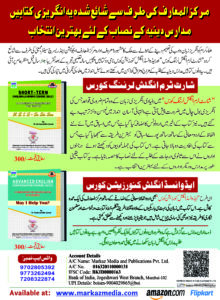
After the Prophet (saws) migrated to Madinah, several incidents occurred in which some people embraced Islam out of greed, hoping to gain worldly benefits through it. However, when their expectations were not fulfilled—and instead they were tested with trials—they reverted to disbelief. Ayah 11 alludes to such people: they do not accept the truth because it is the truth, but only for the sake of worldly gain. Their example is like that of a man who stands on the edge of a battlefield, waiting to see which side gains the upper hand, so that he may join the stronger party.
The meaning of Ayah 18 is that everything prostrates to Allah—that is, all things function in accordance with His command.
Ayahs 19 to 25 describe the rewards of the people of Paradise and the punishments of the people of Hell.
The message of Ayahs of Surah Haj 26 and 27 is that the House of Allah (the Ka‘bah) existed even before Prophet Ibrahim (saws), but it was destroyed during the Flood of Noah. Allah then revealed to him the location where it was to be rebuilt. He was given three commands:
- To avoid associating partners with Allah—obviously, prophets cannot commit shirk; this command was meant for all humanity through him.
- To keep the House of Allah pure for worshippers—this highlights the importance of cleanliness in all Masjids.
- To call people to perform Hajj—people from all over the world would come. Ahadith indicate that Prophet Ibrahim (as) climbed the mountain and called out, and the souls of those destined for Hajj responded “Labbaik” (Here I am).
Ayah 29 instructs that after performing the sacrifice, pilgrims may trim their hair and nails, and it also commands the performance of the Tawaf al-Ziyarah.
The Command of Sacrifice for Every Ummah
Ayah 34 of Surah Haj states that every ummah was commanded to offer animal sacrifice. In ayah 36, it is mentioned that the meat of the sacrifice should be eaten by oneself and also shared with those in need.
Ayah 37 states the purpose of animal sacrifice: “Their flesh and blood do not reach Allah: it is your piety that reaches Him. Thus Allah has subjected them to you, so that you may glorify Him for the guidance He has given you…”
The summary of the subsequent ayahs is as follows: When the disbelievers in Makkah oppressed the Muslims, they were instructed to exercise patience, and fighting was not permitted at that time. They were reassured that Allah would defend them. Later, after migrating to Madinah, permission was granted to retaliate against any oppression by the enemy, because if such action were not allowed, places of worship would be destroyed and no one would remain to invoke the name of Allah. This was also the purpose for which the earlier prophets engaged in Jihad.
Ayah 58 highlights the virtue of migration (Hijrah) and martyrdom (Shahadah). Ayah 73 questions why people worship idols if they cannot even remove a fly from their own bodies, emphasizing the uselessness of idol worship.
You May Also Like
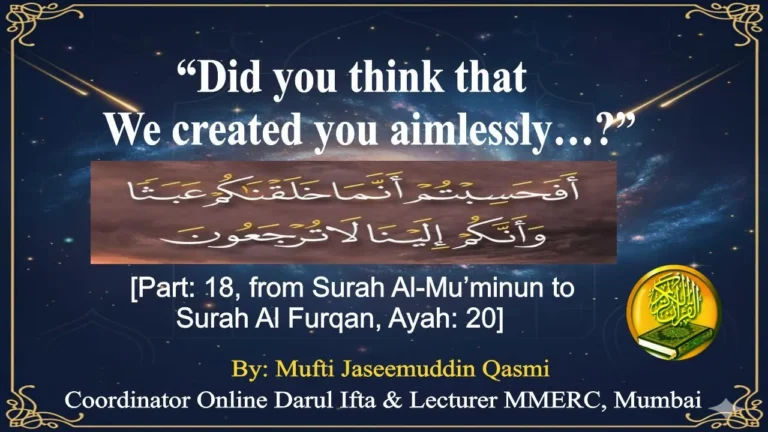 Qur'anic Wisdom
Qur'anic Wisdom“Did you think that We created you aimlessly…?”
“Did you think that We created you aimlessly…?” [Part: 18, from Surah Al-Mu’minun to...
 Qur'anic Wisdom
Qur'anic Wisdom“Whoever turns away from My remembrance, indeed, he will have a life of great hardship”
“Whoever turns away from My remembrance, indeed, he will have a life of great...
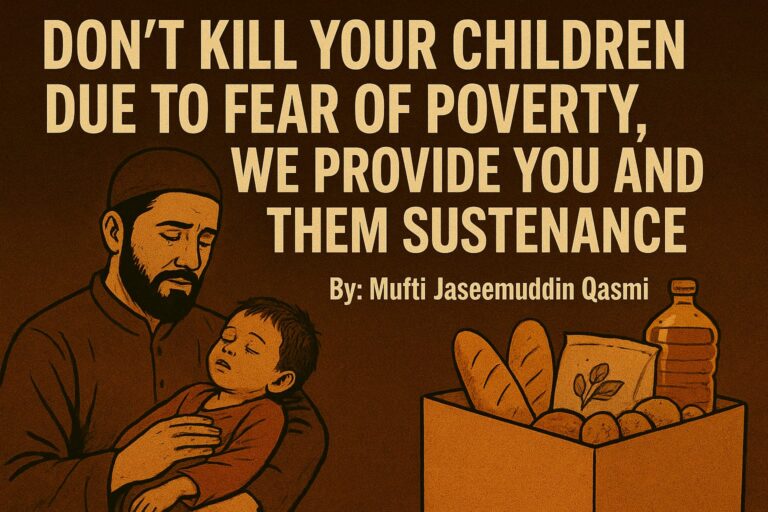 Qur'anic Wisdom
Qur'anic WisdomDon’t Kill Your Children Due to Fear of Poverty, We Provide You and Them Sustenance
Don’t Kill Your Children Due to Fear of Poverty, We Provide You and Them...
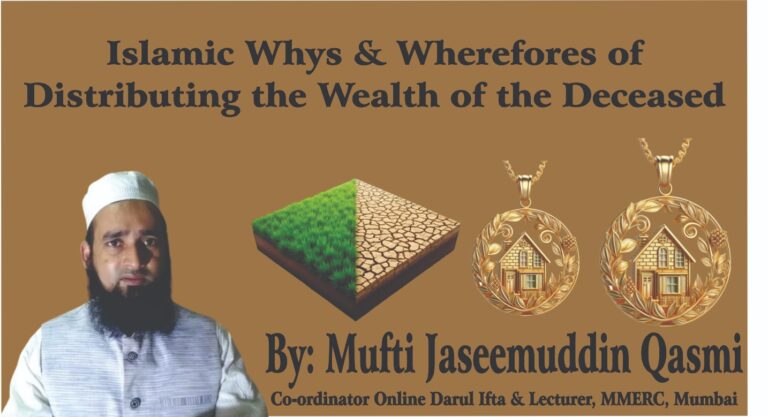 Prophetic Injunctions
Prophetic InjunctionsIslamic Whys & Wherefores of Distributing the Wealth of the Deceased
Islamic Whys & Wherefores of Distributing the Wealth of the Deceased By: Mufti Jaseemuddin...
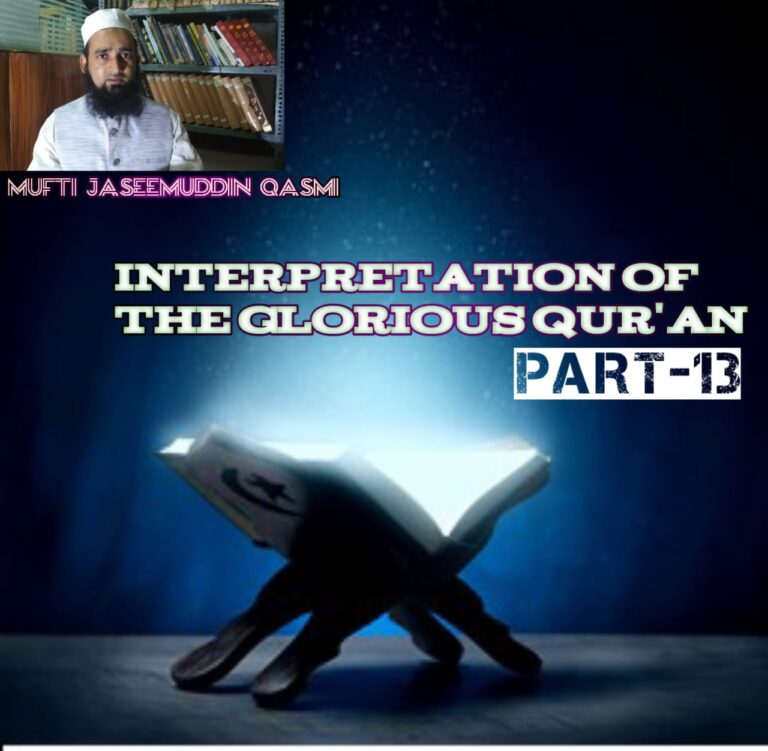 Islam
IslamIndeed, Allah does not change the condition of a people until they change what is in themselves
Indeed, Allah does not change the condition of a people until they change what...
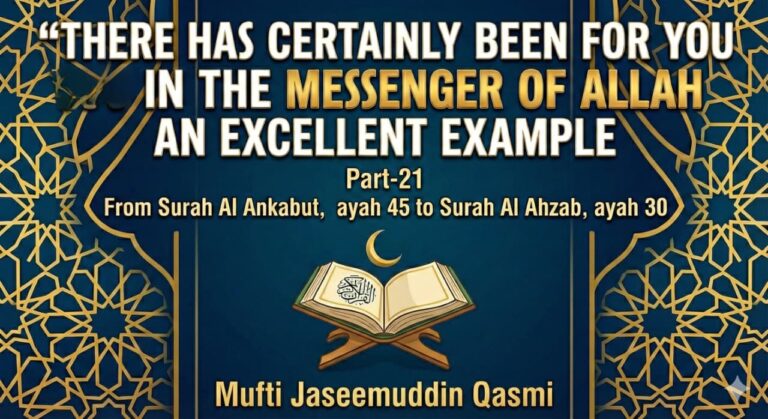 Qur'anic Wisdom
Qur'anic WisdomThere Has Certainly Been For You in the Messenger of Allah an Excellent Example
There Has Certainly Been For You in the Messenger of Allah an Excellent Example...

Comments (1)
Leave a Comment
I loved as much as you'll receive carried out right here. The sketch is attractive, your authored material stylish. nonetheless, you command get got an nervousness over that you wish be delivering the following. unwell unquestionably come further formerly again since exactly the same nearly a lot often inside case you shield this increase.